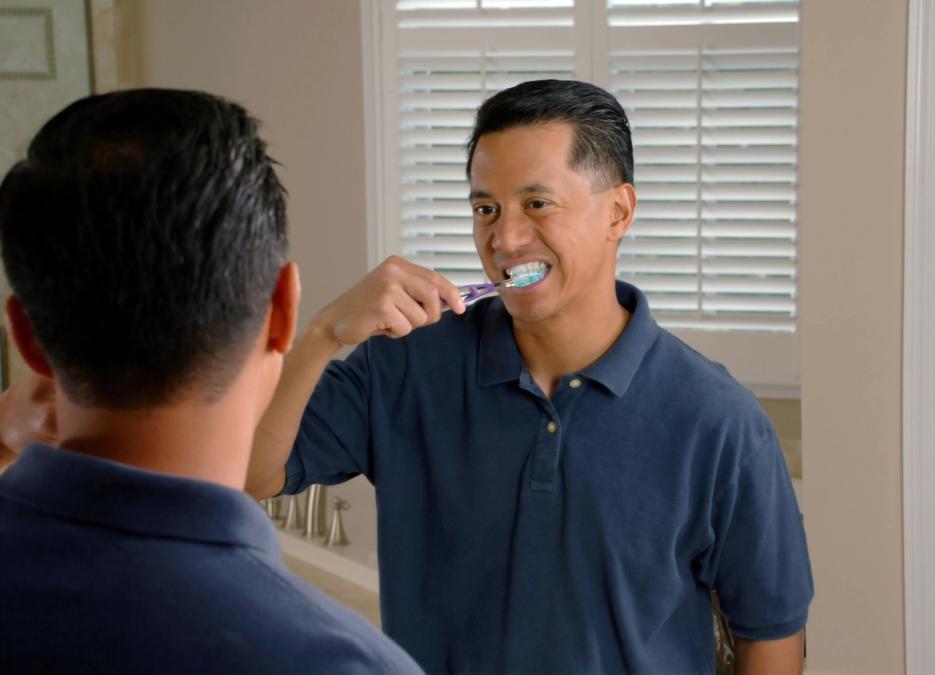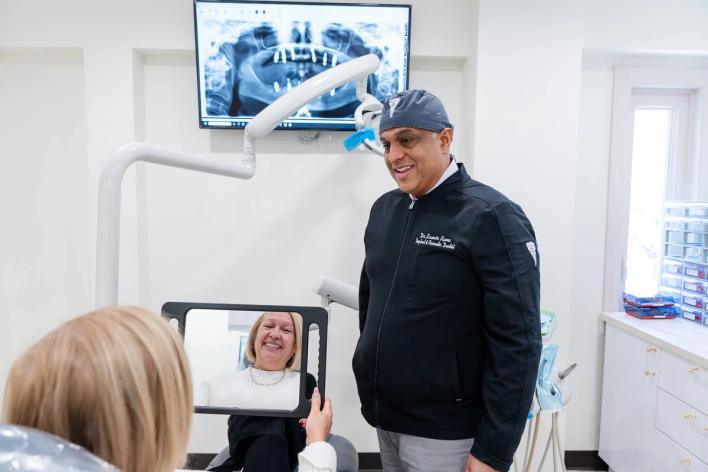Healthy Teeth, Healthy Body: The Oral–Whole-Body Connection
Published on Aug 8, 2025 | 8 minute read

If you’ve ever wondered whether a healthy mouth really affects the rest of you, the short answer is yes. Preventive dentistry isn’t just about clean teeth; it’s about lowering the daily “inflammation load” your body carries. When your gums are calm, your bite is comfortable, and your hygiene habits are steady, everything from your energy to your confidence gets a lift. Here’s how your oral health and whole-body wellness connect—and what you can do this week to stack the odds in your favor.
How the mouth talks to the body
Your mouth is a busy intersection of blood vessels, nerves, and microbiome. When plaque sits along the gumline, it triggers inflammation. Gums get puffy and bleed, tiny pockets form, and bacteria slip beneath the surface. From there, bacterial byproducts and inflammatory signals can enter the bloodstream. Preventive dentistry steps in early with professional cleanings that clear the buildup and with coaching that makes home care realistic. The goal: fewer flare-ups, fewer bacteria, less burden on your immune system, and steadier oral tissues that don’t leak inflammatory signals into circulation.
Gum disease and systemic stress
Gingivitis is the early, reversible form of gum disease. Left alone, it can progress to periodontitis, where the bone that supports your teeth starts to break down. That’s not just a dental problem; it’s a chronic inflammatory condition. People with active periodontitis often report bleeding gums, bad breath, and tender chewing—but sometimes there are no obvious symptoms. Preventive dentistry keeps the spotlight on the warning signs and adjusts your care plan—like shorter intervals or targeted treatments—before bone or gum support is lost. The idea is to keep small problems small.
Diabetes, heart health, and more
There’s a two-way street between gum health and conditions like diabetes. Poorly controlled blood sugar can make gums more reactive, while gum inflammation can make it harder to keep blood sugar steady. Researchers also discuss links between periodontitis and cardiovascular concerns. To be clear, brushing won’t replace cardiology care, but steady preventive dentistry reduces oral sources of inflammation that your body would otherwise have to manage. Think of your mouth as one lever in a much larger system.
Habits that help your body—not just your smile
• Brush twice daily with a fluoride toothpaste; floss once a day.
• Choose water over sweetened drinks and limit grazing between meals.
• Swap a sticky afternoon snack for nuts, cheese, or yogurt.
• Keep a small travel kit at work or in your bag (brush, floss picks).
• If you’re on medications that cause dry mouth, ask about neutral fluoride rinses or gels.
Preventive dentistry thrives on consistency. The technique doesn’t have to be perfect to be effective; it just needs to be routine.
Protective treatments that lower risk
At your preventive dentistry visit, you may hear about fluoride varnish, sealants for deep grooves, or a personalized home-care plan. Fluoride helps enamel resist acid attacks and remineralize. Sealants act like clear shields over chewing surfaces to block food and bacteria. If you’ve had frequent cavities or gum inflammation, your team might suggest shorter intervals, localized antimicrobial rinses, or special brushes. Small steps now can prevent complicated restorative dentistry later.
The “Benefits” per professional groups
Professional organizations emphasize prevention because it works. Routine cleanings help remove tartar that toothbrushes can’t dislodge. Exams catch early cavities, cracked fillings, and signs of gum disease before they become painful. Many public-health sources discuss associations between oral health and overall wellness—from pregnancy outcomes to heart and respiratory concerns. The consistent message is simple: preventive dentistry supports healthier gums, fewer emergencies, and more predictable outcomes over time. That’s why dental and medical communities increasingly collaborate on prevention.
Sleep, stress, and your teeth
Grinding or clenching from stress can wear enamel and strain jaw joints. Morning headaches, flat tooth edges, or chipped enamel are common clues. Preventive dentistry can include a nightguard to spread bite forces and protect teeth while you sleep. Your dentist can also screen for airway concerns—like scalloped tongue edges or dry mouth—that may hint at snoring or sleep-disordered breathing. When needed, you’ll be referred for medical evaluation, because helping you feel rested is part of protecting your long-term oral health.
What about kids and teens?
Kids pick up habits early, so keep it simple and consistent. Use a rice-sized smear of fluoride toothpaste until they can spit, then a pea-sized amount. Teach them to brush along the gumline and floss the tight contacts. Teens need reminders about sports drinks and late-night snacks, plus help cleaning around orthodontic wires or clear aligners. Preventive dentistry for young people is a smart investment—sealants, coaching, and regular cleanings dramatically reduce the chance of surprise cavities.
When life gets busy, keep a “minimum routine”
Some seasons are hectic. If you can’t do every step, pick a minimum routine: brush twice, floss once, drink more water, and swish after snacks. Then get back on your normal plan as soon as you can. Preventive dentistry isn’t about perfection; it’s about momentum. Each good day makes the next one easier.
Why preventive visits matter even when nothing hurts
Pain is a lagging indicator in dentistry. By the time a tooth aches, the problem has often grown large or deep. Preventive dentistry flips the script: it looks for pattern changes—new plaque traps, early enamel softening, subtle gum bleeding—so you can course-correct before discomfort begins. Think of it like regular oil changes for your car; they’re inexpensive compared with engine repairs. The same logic applies to teeth: steady maintenance keeps everything running smoothly.
Bringing it all together
A healthy mouth lightens the load on your whole body. With preventive dentistry, you’re lowering inflammation, stabilizing your bite, and keeping bacteria in check. The payoff shows up everywhere—more comfortable meals, better breath, and a smile you’re happy to share. Keep your routine steady, and lean on professional cleanings and checkups to fine-tune the details.
Ready to make preventive dentistry part of your wellness plan? Contact Comprehensive Dental & Implant Center at 973-791-7674 to Schedule a Consultation in Lincoln Park, NJ.
Quick wins you can start today
Set a 2-minute timer when you brush. Swap soda for sparkling water with meals. Keep floss picks in your car for red lights. If morning breath sticks around, scrape your tongue gently. And schedule your next preventive dentistry visit before you leave the office so it actually happens—future you will be glad you did.

